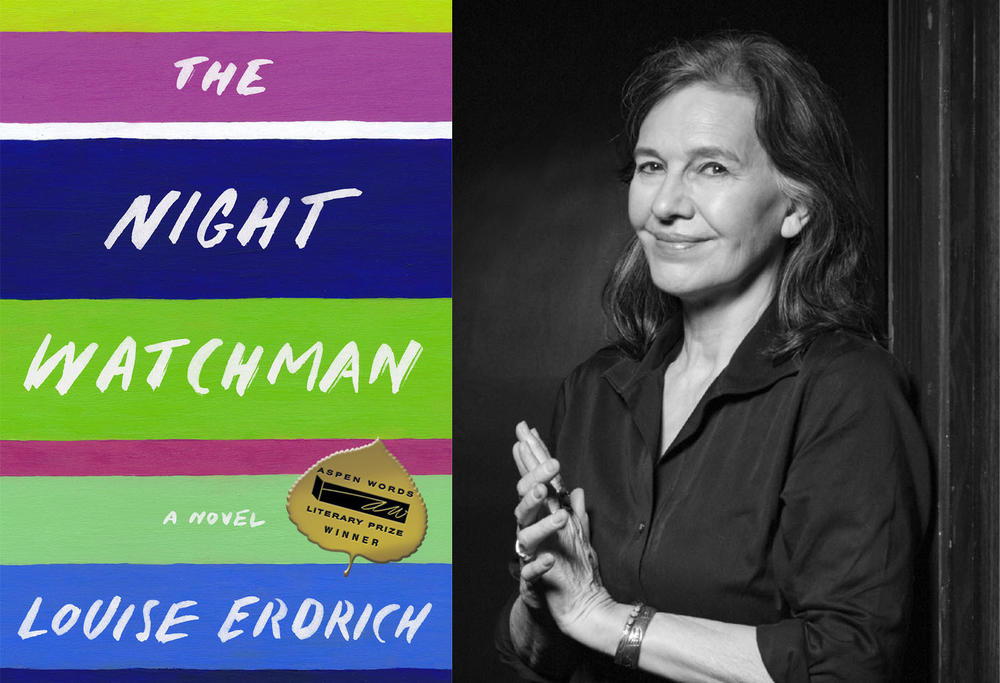Section Branding
Header Content
Louise Erdrich Takes Home Aspen Words Literary Prize For 'The Night Watchman'
Primary Content
In a virtual ceremony tonight, Louise Erdrich was named the winner of this year's Aspen Words Literary Prize, for her novel The Night Watchman. The $35,000 prize goes to a work that "illuminates a vital contemporary issue and demonstrates the transformative power of literature on thought and culture."
The novel, set in the early 1950s, follows a man named Thomas Wazhashk, "named for the muskrat, wazhashk, the lowly, hardworking, water loving rodent." Thomas works as a night watchman at a North Dakota factory, but he's also a Chippewa tribal elder at a time when the federal government is trying to break its treaties with Native American tribes and end their rights to their traditional lands — a process known as termination.
"Termination was a way to finally resolve the — what Congress thought of as the Indian problem, and that would be to move everyone off reservation land because it wouldn't be reservation land anymore, turn over their land, sell their land, move everyone to cities," Erdrich told Fresh Air's Dave Davies last year. "And the most important part in doing that was to abrogate all treaties. And these treaties had been made since the beginning of our country on a nation-to-nation basis with every tribe. And they all contain these words, as long as the grass grows, as long as the rivers flow."
Federal efforts at termination officially ended in 1975 — but the aftermath is still felt today. As recently as last year, Connecticut's Mashpee Wampanoag tribe was battling an attempt by the Trump administration to disestablish its reservation and take its lands out of federal trust.
The jury for this year's prize included authors Emily Bernard, Sarah Ladipo Manyika, Viet Thanh Nguyen, Daniel Shaw and Luis Alberto Urrea.
In a statement, Urrea called The Night Watchman "a magisterial summation of [Erdrich's] influential work" that also builds a foundation for the future. "A historical novel that is also a story of love, a familial chronicle, a book about Indigenous community and anti-tribal animus, it opens worlds incessantly," Urrea said. "It can move from comedic visions of eccentric boxers to terrifying stories of the disappearances of Native women, hints of ghost stories and a prophetic explosion of violence inside the nation's capital city. It is a wise and transformative masterwork."
In an interview last year, Erdrich told Weekend Edition's Scott Simon the book was inspired by her own grandfather, who — like Thomas — was a leader of the Turtle Mountain Band of Chippewa. "I reread his letters every so often to get a grip on why I'm doing this writing. I mean, he was a wonderful writer. His letters are beautiful, full of humor and storytelling," she said "And what I think I absorbed was his sense of decency, and his commitment to his family and his people."
And in remarks recorded for today's program, Erdrich accepted the award on his behalf, calling him "one of the dwindling number of first speakers of the Ojibwe language, in addition to all his activism," adding that "this particular award will go to assist in the revitalization of the Ojibwe language."
You can see the entire ceremony — including a conversation with Erdrich and three of the finalists, moderated by All Things Considered's Mary Louise Kelly — here.
Copyright 2021 NPR. To see more, visit https://www.npr.org.
Bottom Content




